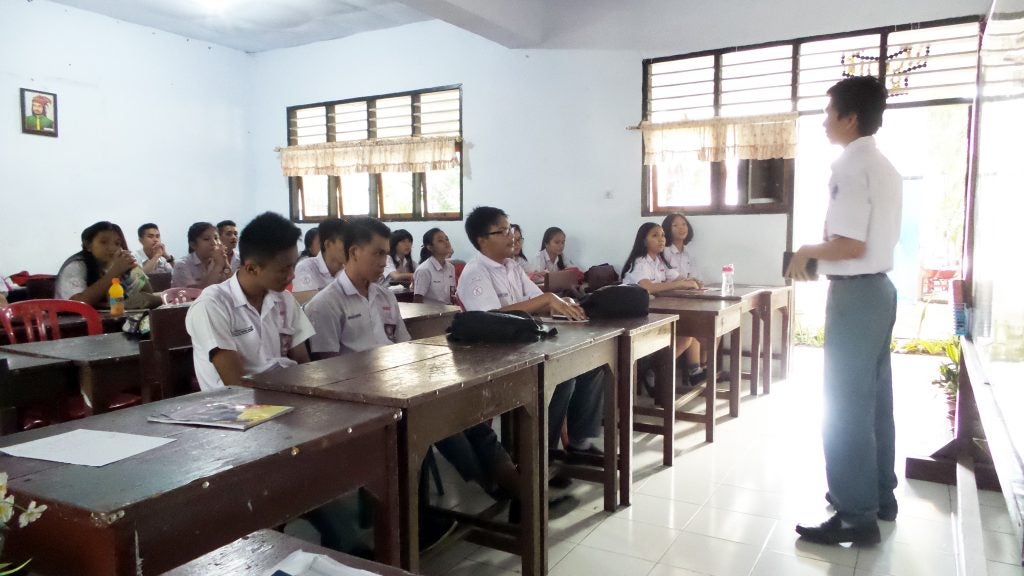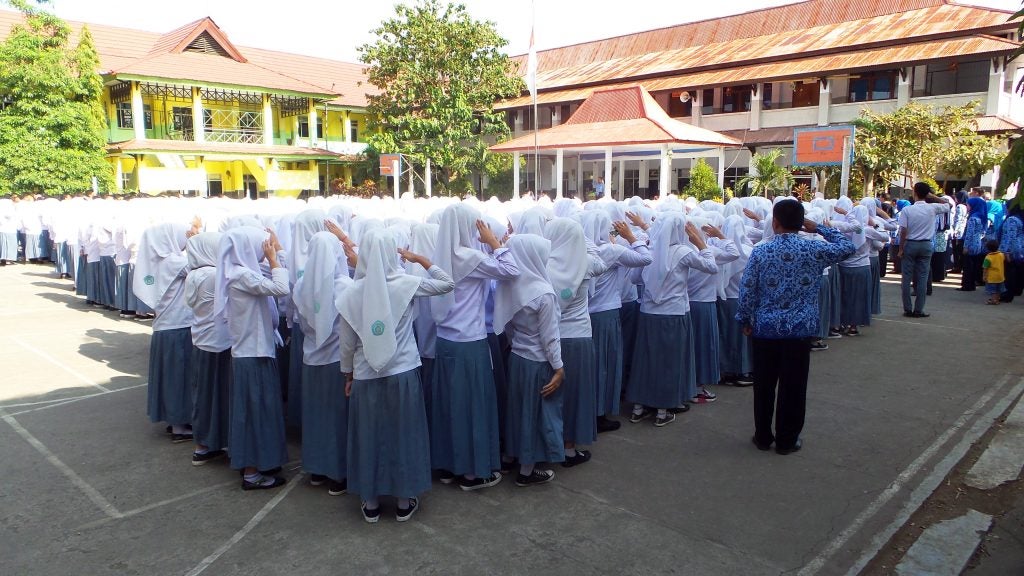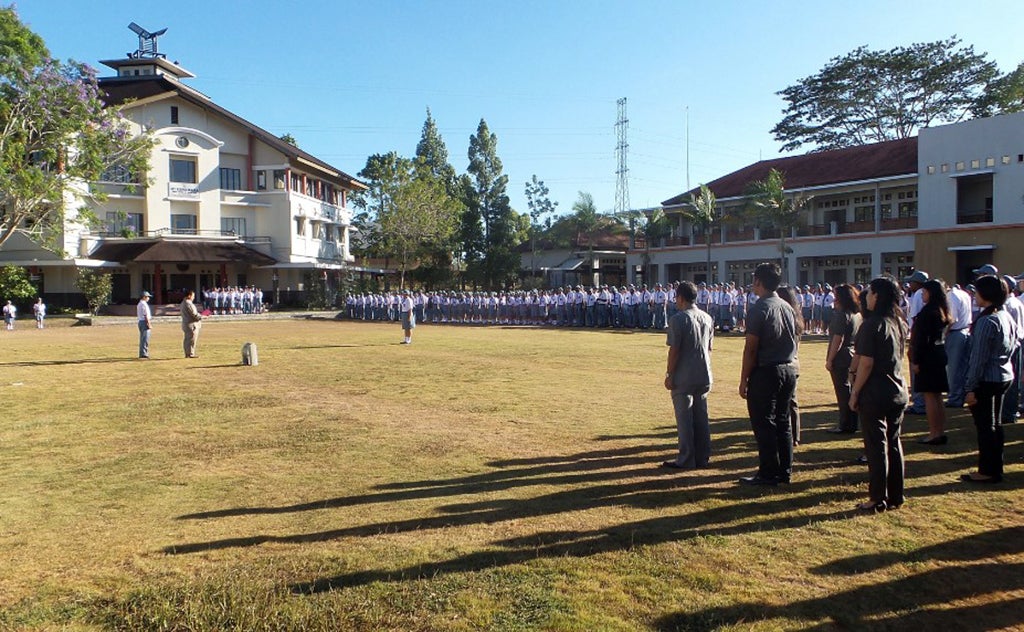What are Indonesian schools teaching about religious tolerance?
Erica M. Larson, 15 Oct 2020

A student at the public school leads his classmates in worship during the Protestant religious education class. Photo courtesy of the author
Observers have noted a continuing ‘conservative turn’ in Indonesian Islam. Ideological divides pitting pluralist moderation against conservatism have surged to the forefront of the country’s political scene. Reliance on identity politics in the 2017 Jakarta gubernatorial and 2019 Indonesian presidential election intensified polarization along religious lines. These developments have also raised questions about the strength of Indonesia’s commitment to both democracy and religious coexistence.
But what about young Indonesians — how are they responding to this trend? And what role do schools play in shaping how youth think about religious diversity and tolerance in a climate of increasing religious divisions?
Despite an expectation that increasingly educated and middle-class youth would hold more moderate views, some research indicates that religiously intolerant and radical views have become increasingly mainstream among high school and university students.
This development in youth attitudes has often been interpreted a natural outcome of increasing religious piety among youth. Others have attributed it to an expression of latent fears related to economic precarity. Avoiding these unwarranted assumptions, my research has sought to understand how schools contribute to the way that youth learn to understand and approach religious difference.
What are schools teaching youth about tolerance? Ultimately, they are exposing them to varied understandings of how to approach religious diversity and contradictory visions of religious tolerance.
Case Study: High Schools in North Sulawesi
Schools are important for exposing students to religious and civic education, and also for providing a space where they can interact with peers. As institutions, they are also linked to national projects. Indeed, schools in particular are one of the primary arenas where debates take place about the role of the state in regulating religion and about the role of religion in public life. In other words, schools are not fortresses immune to the political contentions taking place in broader society, but act as a public sphere where these questions are deliberated.
To investigate the ways that youth learn about and understand religious diversity, I conducted field research in and around the city of Manado in the majority-Protestant province of North Sulawesi. Manado is often touted as a model city for religious harmony in Indonesia, making it an interesting and apt locale to investigate these questions about socialization into various perspectives on religious diversity.
I identified three different high schools with varying public/private statuses and religious affiliations where I observed classes and extracurricular activities, and where I spoke to teachers, students, and administrators. During my ethnographic research, I used these three schools as major focal points. In addition, I also documented debates in the broader public sphere and spoke to religious and community leaders. This methodological strategy allowed for a better understanding of how these public debates manifested in the school environment.
Each of the schools implements the recently overhauled 2013 national curriculum, which, in addition to improving math and science performance, has been called upon to help curb intolerance and radicalism among the younger generation. Despite this common curriculum, I found extremely varied interpretations of the role of the school in teaching about tolerance, and different assumptions about the best way to ensure religious coexistence and cultivate respect for religious diversity.
Public High School
At one of the major public high schools in Manado with a solid academic reputation and a religiously and ethnically diverse student body, many of the school policies and realities reflect issues being deliberated in the public sphere. Already, the religious demographic of the more than 2,000 students approximates the general population in Manado: a Protestant majority with a sizeable Muslim minority and smaller groups practicing other officially recognized religions in Indonesia (Catholicism, Hinduism, Buddhism, Confucianism).
Though a public school, all students receive mandatory religious instruction in their professed religion (as is required by law), and administrators are supportive of an increased focus on religion to shape the moral character of students. The official discourse about respect for religious diversity in the school, however, is accompanied by practices that ultimately assert a Protestant majoritarianism. This reality is reflected in the allocation of space for worship, the deployment of greetings and prayers, and policies regarding dress and cafeteria food, all of which establish a Protestant hegemony in the school environment.
Each of these practices relates to debates taking place in the broader public sphere about religious coexistence and accommodation, reflecting a tendency to assert the importance of respect for religious diversity while simultaneously maintaining an implicitly Christian public sphere.
Public Madrasah
At the largest public madrasah (Islamic day school) in the region, more than 1,400 students make up the exclusively Muslim student body. Students at the madrasah complete the national curriculum and also receive additional hours of religious instruction. When prompted, teachers at the school express pride about the region’s status in maintaining religious harmony and enjoy citing Islamic principles that support coexistence.

Students salute the flag during a ceremony at the public madrasah. Photo courtesy of the author
However, these topics rarely come up in the classroom, and when they do, are glossed over and discussed in an abstract manner. Teachers assume that religious tolerance is something that students will need to learn through practice in their daily lives outside the school as they encounter people of other faiths. In other words, it is assumed that tolerance is learned through experience and does not need to be emphasized or discussed at length in the classroom.
Teachers and administrators at the madrasah view the lack of religious knowledge of students as the biggest threat to tolerance. They ultimately understand their role as giving students a strong foundation in Islamic principles that will allow them to properly enact tolerance outside of the school when given the opportunity.
Private Catholic School
A small and elite private boarding school with an informal Catholic affiliation houses more than 400 high school students on a well-maintained campus outside of Manado. It aims to build character and teach Christian values to potential future leaders of the region or beyond, as its reputation and network is able to draw students from other provinces in Indonesia.

Teachers and students stand in the private school’s central courtyard for a flag ceremony. Photo courtesy of the author
The approach to teaching diversity contrasts with the two schools mentioned above in its articulation of a multicultural vision and mission to educate students of varying religious and ethnic backgrounds, bringing them together on one campus. The majority of students are Protestant, with a sizeable Catholic minority and several students who follow other religions. All students are required to take Catholic religious education courses, regardless of their professed religion.
Teachers discourage students from mentioning any form of difference, whether related to ethnicity, religion, or friend groups. The approach is based in a Catholic universalism, foregrounding the contribution that Christian values can bring to the Indonesian nation. At the same time, as the school easily accommodates ethnic difference in principle, the ethnic and class difference of Papuan students compared to other students is often reinforced in interactions with teachers and peers. For example, Papuan students are often assigned to the same dormitories, and typically form friend groups among themselves, effectively minimizing the time they spend among students from other ethnic backgrounds. Thus, while other forms of difference—including religious difference—are downplayed or ignored, this particular ethnic difference becomes a major focus and challenges the discourse of inclusion.
Consequences
My research contends that schools are central to a continued negotiation of the relationship between democratic and religious values in Indonesia. Three high schools described here implement the same national curriculum and are located in a region where there is a normative acceptance of the discourse of religious harmony. Yet, they show highly varied interpretations about the role of schools in promoting tolerance, and the most effective way to do so. In addition, each faces challenges in implementing their different approaches.
Investigating schools as sites of deliberation means not only looking at how schools influence young Indonesians, but also how the understandings students draw from them may feedback to these broader societal debates about living in a plural society.
It is important to recognize that schools are sites of deliberation about the future of multi-religious and multi-ethnic Indonesia. As youth are exposed to a variety of frameworks and directives regarding diversity in their schools, families, and religious communities, it is clear that the political and the educational are intimately intertwined. Even as schools support religious diversity and coexistence in discourse and implement the same national curriculum, there is a lack of consistent messaging on what these terms mean and how to implement them in practice. Youth are navigating these varied visions of coexistence, and in doing so, are shaping the future of Indonesia.
 Erica M. Larson holds a Ph.D. in Cultural Anthropology from Boston University (USA). Her research interests include education, religion, ethics, and politics. Her dissertation research examined civic and religious education programs at various high schools in North Sulawesi, Indonesia, in order to understand how they become important sites for deliberating the ethics and politics of plural coexistence.
Erica M. Larson holds a Ph.D. in Cultural Anthropology from Boston University (USA). Her research interests include education, religion, ethics, and politics. Her dissertation research examined civic and religious education programs at various high schools in North Sulawesi, Indonesia, in order to understand how they become important sites for deliberating the ethics and politics of plural coexistence.
Her current research engages Indonesian youth active in religious organizations and their attitudes and beliefs about corruption as a lens on normative state-society relations and notions of ethics and responsibility. She will join the Religion and Globalisation Cluster at the Asia Research Institute as a Postdoctoral Fellow in 2021.'
Disclaimer: The views and opinions expressed in this article are those of the authors and do not necessarily reflect the position of the editorial team or the Asia Research Institute.

